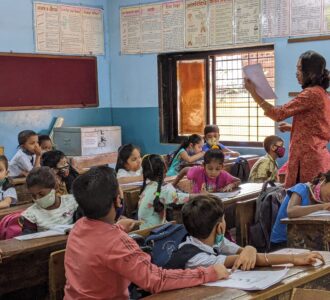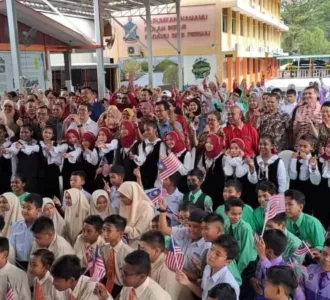Alongside Africa and Asia, Latin America contains some of the highest levels of learning poverty in the world. This has only been compounded by some of the world’s longest school closures during COVID.
But leaders from across Latin America are showing the continent’s potential to harness education to affect real change. The work of the Finalists for the inaugural Latin America Education Medal cuts across some of the greatest challenges faced by the continent and their solutions bring crucial new perspectives on enduring problems.
Equity

With some of the highest levels of inequality in the world, it’s not surprising that equity is the theme that, more than any other, runs through so much of the work of Latin America’s education leaders.
Darío Álvarez Klaris the Founder of Itínere Education Network, which includes schools across Argentina and Uruguay, totalling nearly 6,000 students and 1,400 staff. Its purpose is to create educational communities that inspire, promote equity, and offer quality education that prepares students to face the challenges of the 21st century. One of the fundamental pillars of Alvarez Klar’s work is building communities that enhance the impact of each institution. He promotes collaborative actions with universities, companies, and various entities, transforming schools into integrated work networks with these organisations.
Also working in Uruguay is María Victoria Varela, a Special Education Teacher who is currently serving as Deputy School Director at School N°240 “Paul Harris”, a school located in Montevideo, in the Carrasco Norte area. Through her work, she is accompanying almost 200 students with disabilities and others with severe learning difficulties in their educational journeys, ensuring they are included in standard schooling.
Meanwhile, for Leo Schlesinger, former CEO of Aliat Universidades, an integrated group of seven higher education institutions operating across 27 campuses in 13 states in Mexico, the focus has been on on delivering quality and relevant education and improving social mobility and accessibility for marginalised communities nationwide.
In Brazil, Jair Ribeiro, Founder and President of Parceiros da Educação (Partners in Education), is working to transform the São Paulo public educational system into the best of Latin America by 2040. Reforming public education in Brazil poses a huge challenge, as the country ranked among the lowest in the OECD’s PISA, and São Paulo, Brazil’s most populous state, has a student population as large as leading economies such as France and the UK. Ribeiro founded Parceiros da Educação in 2004, which began by adopting one single public school in São Paulo’s most vulnerable neighbourhood. Over the years, he has led a team of specialists that developed Parceiros unique methodology, growing from that initial school to over 730 public schools directly impacting the lives of over 400,000 students.
Fellow Brazilian, Tatiana Klix uses the media to pursue equity. She is Executive Director of Porvir, a non-profit organisation including Brazil’s most important education media platform. Porvir’s mission is to drive transformations that ensure quality and equity in Brazilian education. It does this on two fronts: through the porvir.org media platform that maps educational trends and policies and inspires and informs educators, and a solutions agency that creates communication strategies, content, experiences, and digital platforms to inform, inspire, and support educators.
Environmental education

Another important theme for Latin America’s education leaders, again unsurprisingly given the region’s vital ecological importance, is environmental education.
Arturo Condo, President of EARTH University, leads an innovative global institution based in Costa Rica that prepares young leaders from across the world as change agents for advancing sustainable development and nature-positive food systems. It was here that Dr. Condo led the creation of EARTH Futures, a global centre that aims to transform rural areas and food systems for the better. He has also guided the launch of EARTH Ventures, an initiative to launch new businesses with purpose that contribute to the long-term sustainability of the University.
Meanwhile, Marcela Suárez, Director of Projects of the Colegio Johannes Kepler, an independent school in Quito, Ecuador, works on projects to create a regenerative design and permaculture learning environment that focuses on energy, zero waste, green construction, water management, seed-soil-food and ecosystem restoration. Suárez led her school to revolutionise its curriculum, moulding it to reflect the UN Sustainable Development Goals. Recognising the school’s innovation, Ecuador’s Ministry of Education used it as a basis to transform the country’s curriculum.
Harnessing technology

Environmental skills are essential to Latin America’s future and the future of our planet. So, too, are digital skills.
Colombia’s Freddy Vega is the Founder and CEO of Platzi, the largest tech school in Latin America. Today, every startup in the region has Platzi students and every country has founders who studied at Platzi. Platzi is the largest professional education platform in the Spanish-speaking world and one of the most important online communities specialising in technology and digital skills in Latin America. It has been recognised as #40 in TIME magazine’s top EdTech companies in the world. Vega, one of its founders, helps students acquire new, in-demand skills and stay up-to-date with the tech industry.
Juan Pablo Mena is another leader whose work revolves around technology as the CEO and co-founder of uPlanner, an innovative Edtech company specialising in AI-driven Academic Operations Systems. Founded in 2015 by Mena, a first-generation university graduate, uPlanner was established with a profound understanding of the transformative impact of higher education on students and communities. Under his leadership, uPlanner supports higher education professionals through evidence and data-based decision-making. This approach has empowered governments and universities to assist thousands of vulnerable students, particularly during challenging times like the COVID-19 pandemic.
Supporting teachers

But whilst technology, if used correctly, can help close learning gaps, it’s human teachers that will always make the biggest difference to so many young people’s lives.
Verónica Cabezas recognises this. She is the Co-founder and Executive Director of Elige Educar, a public-private initiative under the Center for Public Policy at Pontificia Universidad Católica de Chile, dedicated to ensuring that all children in Chile have access to outstanding teachers and preschool educators. For Dr. Cabezas, teachers are the cornerstone of a quality education, and efforts to attract, retain, appreciate, and improve their working conditions are the main challenges that have driven her career. Under her leadership, Elige Educar has led various projects such as the Quiero Ser Profe (I want to be a Teacher) initiative, which aims to attract more talent to educational careers. Meanwhile, the Somos Profes programme works with novice teachers during their first three years, aiming to improve teacher retention in the system where 10% of novice teachers leave the profession after their first year in the classroom. Elige Educar has also worked to bring forward public policy proposals that have led to improvements in teachers’ working conditions. Teacher working hours have been brought down whilst salaries have increased by 30%.
The path forward
To fully embrace its potential, Latin America’s education systems must solve inequalities, harness technology, support teachers and ensure that it is creating leaders of tomorrow who will be good custodians of the continent’s natural resources. Most of all, it needs changemakers who will stand up and make a difference in all these areas and more.



